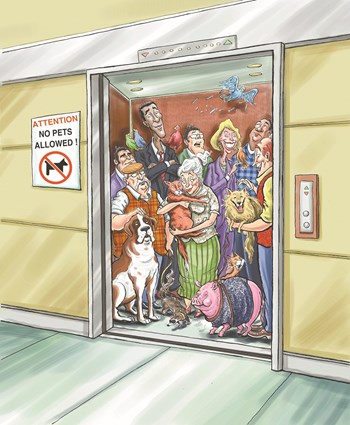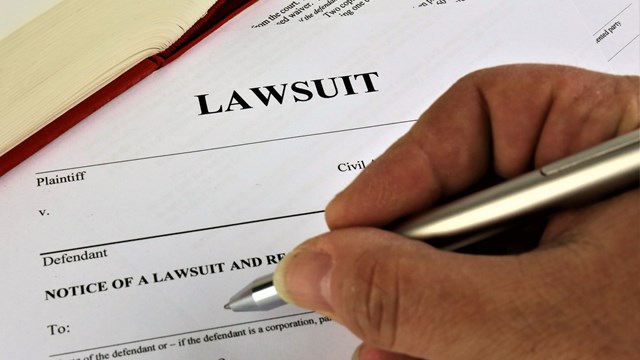
Condo, HOA, and co-op boards are generally made up of volunteers—and they're frequently a pretty diverse group. There’s the stay-at-home mom who’s looking to get involved with something beyond homework and housework. Maybe there’s also the young doctor who just moved into the building and immediately took an interest. Or perhaps there's the retired school bus driver who's got a green thumb and delights in chairing the landscaping committee each spring. No matter what their background, most board members share a genuine desire to serve their building community and have a hand in the way it’s governed. What they may not have in common is a firm grasp of the law and the legal implications of their decisions as board members.
Of course, some boards are lucky enough to have a practicing legal professional among them who can give sound advice and guide their decision-making process. Those not so fortunate may take a more laissez-faire approach to decision making—which may seem a more friendly, collegial way to run things but which can lead to serious and unforeseen headaches in the long run.
For example, if an association or building has had a no-pets rule for years, and all of a sudden the rules are bent—rather than changed officially and through proper channels—to allow a resident to harbor a pet, “You’re creating a lot of problems by allowing just that one pet, because it will be hard to enforce the rule against other owners in the future,” says attorney Barry Kreisler of the Law Offices of Barry Kreisler, P.C. in Chicago.
Or consider the board president who decides to hire his brother for various construction jobs in the building. “The board member may be subject to liability for doing that if something goes wrong and [the brother] wasn’t skilled,” says David C. Hartwell, partner, Penland & Hartwell, LLC in Chicago.
So how do you prevent board members from doing things their own way? Let's take a look.
Rule #1: Know the Rules
Each board member must follow its own rules, especially those spelled out under the Illinois Condominium Property Act, which outline the laws that govern all community associations in the state. All boards are legally required to follow the procedures set forth in this document. If any board member is unfamiliar with the state’s Condominium Property Act or unsure of how to interpret it, they should consult with their association's attorney.
The other main documents that govern co-op and condo living include the certificate of incorporation and the proprietary lease in the case of co-ops, and the declaration of covenants, conditions and restrictions (CC&Rs) for condos, as well as the bylaws and house rules and regulations that govern day-to-day activities in both.
If an issue arises that isn’t covered in these documents, it doesn’t mean that the board as a whole, or an individual board member can simply do what he or she chooses. “The board is an interaction of individual owners of units in the building,” says Kreisler, “and yes, they have personal interests in the decisions they make, but they have to make a good faith effort to follow the rules.”
Rule #2: Know How to Change (or Create) Them
“A board is entitled to establish rules and regulations as long as they are reasonable,” says Kreisler.
And if a rule is going to be changed, says Matthew L. Moodhe, managing principal of the law firm of Kovitz Shifrin Nesbit in Buffalo Grove, that decision has to be made in an open board meeting. “The shareholders or the unit owners are entitled to notice and a right to be present during board meetings,” he says. “This is all governed by the Property Act and the other laws.”
Rule #3: Keep Your Feelings Out of It
Board members are volunteers—people who give up some of their free time to devote to the upkeep and responsibilities of the building—and they each come with a personality and opinions.
“It’s hard to separate personal feelings from the process and the decisions they make,” says Hartwell. “I don’t know of any circumstance where a board member [blatantly] set aside fiduciary responsibility in preference for their individual agenda but that doesn’t mean that decisions aren’t influenced.”
Hartwell adds that there’s no doubt that documents and bylaws are amended from time to time based on the personal preferences of a collective board but that board members really can’t exert their own personal preference. “That’s not to say that there aren’t very strong members who serve on weak boards and can influence others but if they do that they are subject to liability or breach of fiduciary responsibility,” he says.
Rule #4: Know the Exceptions
According to Moodhe, the board of directors does have the authority to grant exceptions or waivers to rules and policies. “We suggest, however, that the board attempt to be as uniform and consistent as possible, and the reasons behind the exceptions are well documented and contained,” he says.
Moodhe explains that when another resident comes before the board and asks for an exception to the same or another rule, the board can then say they are selectively enforcing it and they can defend their decision legally.
“Not every set of circumstances are the same,” says Moodhe. “Typical exceptions can be unanticipated family hardships—documented medical or death, for example—those type of exceptions happen all the time.
”Rule #5: Work With an Attorney
When an issue comes up that the board doesn’t feel confident about, they should contact their building attorney. “How we address it is we ask what the declaration says and seek an interpretation,” says Hartwell. “But just because we provide an opinion doesn’t mean board has to follow it. Sometimes the legally proper outcome can seem unfair. It’s fine that the board substitute their opinions, as long as it doesn’t violate the terms of declaration, or state law.”
Hartwell says that sometimes a board is so inexperienced they simply don’t know to ask for help on a particular issue. “It’s hard to find volunteers, especially for some of the associations where you have to volunteer more than 10 hours a month,” he says. “Inexperienced board members who have never been in a position like that and don’t know they are in trouble don’t know that what they were doing was inconsistent. Most declarations are 35 to 45 pages long, and it's rare that anyone really reads them.”
Rule #6 and #7: Vote Out Problem Members—and Know the Consequences of Not Doing So.
If a board member consistently tries to break or selectively “forget” about the rules, they should not serve or be re-elected. Keeping a loose cannon like this on the board can lead to all kinds of problems—particularly if their behavior is known and acknowledged. Acting in bad faith, or allowing bad faith to persist can have serious legal ramifications, including paying damages out-of-pocket in the event of a lawsuit or criminal investigation.
“In a condo association, there are annual elections, but ultimately the members can vote for removal if they aren’t happy with the way decisions are being made,” says Kreisler. “If it’s clear the board were acting improperly, they can also be personally liable for breach of duty. A board member can be liable for attorney fees in a lawsuit too.”
Rule #8: Get Back on Track
Okay, so your board made an unintentional mistake. Or maybe a previous board made the mistake and your current board wants to get decision-making back on track. Even if you've made or inherited a mess, it’s never too late to start the process of making it right.
“You have to decide if you want to enforce this rule, not enforce it, take it off the books or amend your rules or documents,” says Moodhe. “If a prior board chose not to enforce a covenant or rule, it doesn’t mean a future board can’t do so. If the board intends to enforce a rule, then we suggest that you give your community some advance notice that it wasn’t enforced before, but will be going forward. For anyone who breaks a rule, issue a warning first—not a fine. Take these small steps at the beginning, and then you can fully enforce.”
No matter whether you're a six-unit, walk-up condo or a sprawling suburban HOA, whether your board is thick with attorneys or has no legal experience other than that gained on the job, it's vital to understand that the decisions you make are not just for the here-and-now; their influence may be felt for years to come. That's why it's so vital to follow the rules above—in cooperation with competent legal counsel of course—and remember that today's decisions are tomorrow's precedents.
Lisa Iannucci is a freelance writer and author and a frequent contributor to The Chicagoland Cooperator.






Leave a Comment